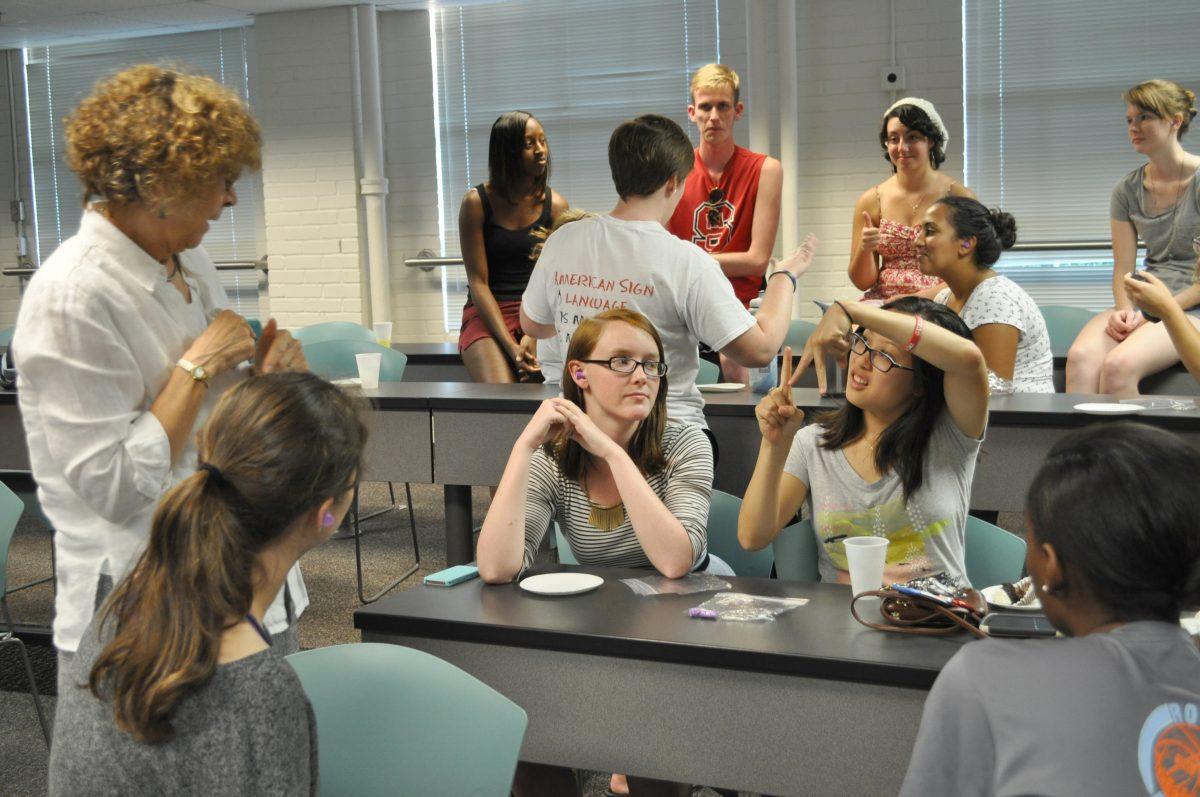N.C. State’s American Sign Language club welcomed 35 prospective members to its first meeting of the year Tuesday evening.
Alzebeth Roman, a senior in accounting who was raised by two deaf parents, and Jessica Sadeckas, a junior in business administration, founded The ASL club in 2012. The club aims to promote awareness about deaf culture, instruct participants in basic Sign Language and emphasize an appreciation for diversity.
The club’s president, Maura Dixon, a junior in English, is looking forward to her new roll after spending a year as the secretary.
“I’m dedicating all my time to this organization because I feel like it’s important for us to know ASL and about deaf culture,” Dixon said.
Joining Dixon are Vice President of Marketing Sadeckas, Vice President of Finances Haley Gilroy, a junior in communication, and Vice President of Administration Kaitlyn Wilson, a junior in criminology.
Dean Jeffery Braden, who was not present at the first meeting, and Tovah Wax, an adjunct associate professor of foreign languages and literature, are the club advisors.
“Working with [Wax] has been such a treat. She is here faithfully at every meeting,” Wilson said. “Just watching her sign is so beautiful to me. She’s just so good and she’s so patient, and she’ll ask me questions and she’ll let me know when I’m doing signs correctly and she’ll give me new words to add to my vocabulary.”
While the ASL club is new to N.C. State, Wax informed the group that it is the third most used language in the United States, behind English and Spanish. The problem is, most people in the U.S. can speak English, and many know basic Spanish, but few Americans know ASL if they are not directly linked to deaf culture.
“There’s this whole other culture out there that no one gets to hear about and know about and interact with because it’s just so difficult,” Wilson said. “Raising awareness is one of the prominent things that we’re doing.”
At the beginning of the meeting, students were ushered in by the leaders who would sign their welcome but refused to speak, automatically showing students how uncomfortable it can be when there is a communication barrier, as many deaf persons face.
Spoken introductions were given, presenting the goals of ASL club before the room was split into five groups for an activity. Each group was told to remain silent and participants had to communicate to their peers what their names and majors were via drawing, lip reading and charades—every group was unsuccessful at learning all the information. The groups then tried again after learning the ASL alphabet.
“We want to focus on doing interactive things at our meetings,” Dixon said. “We’ve planned a murder mystery dinner for our meeting that’ll be on October 29, so it’s right before Halloween.”
The leaders, with Wax’s assistance, then taught about regional “accents” in ASL, or slightly different ways of performing the same words. Accuracy was also stressed, as Gilroy shared that she made the mistake of signing “adult relations” instead of “funny,” because the two signs are nearly identical but one uses a single finger and the other uses two.
Outside of club meetings, the club is hoping to get more involved with the deaf community.
“We’re really reaching out to deaf students,” Wilson said. “Obviously we can’t get their information because of privacy things with N.C. State, but just trying to make everyone more aware that we’re here and that we’re willing to communicate.”
There is a small population of 21 students on campus who are deaf or hard of hearing and registered through the Disability Services Office. According to Sabina Vermeulen, the associate director of the DSO, those students are offered assistive techniques, like note taking provisions, text access, assistive listening devices, interpreters and more.
For students who request text access, a DSO provider sits near the student and types what is being said for the student to read. Interpreters attend classes with the registered students and translate a professor’s lecture into ASL, mouth movements or silent repetition.
Those who face difficulty hearing are encouraged to contact the DSO for assistance.
The ASL club meets every other Tuesday in Daniels 218 from 6 p.m. to 7 p.m. The next meeting is on Sept. 24.








